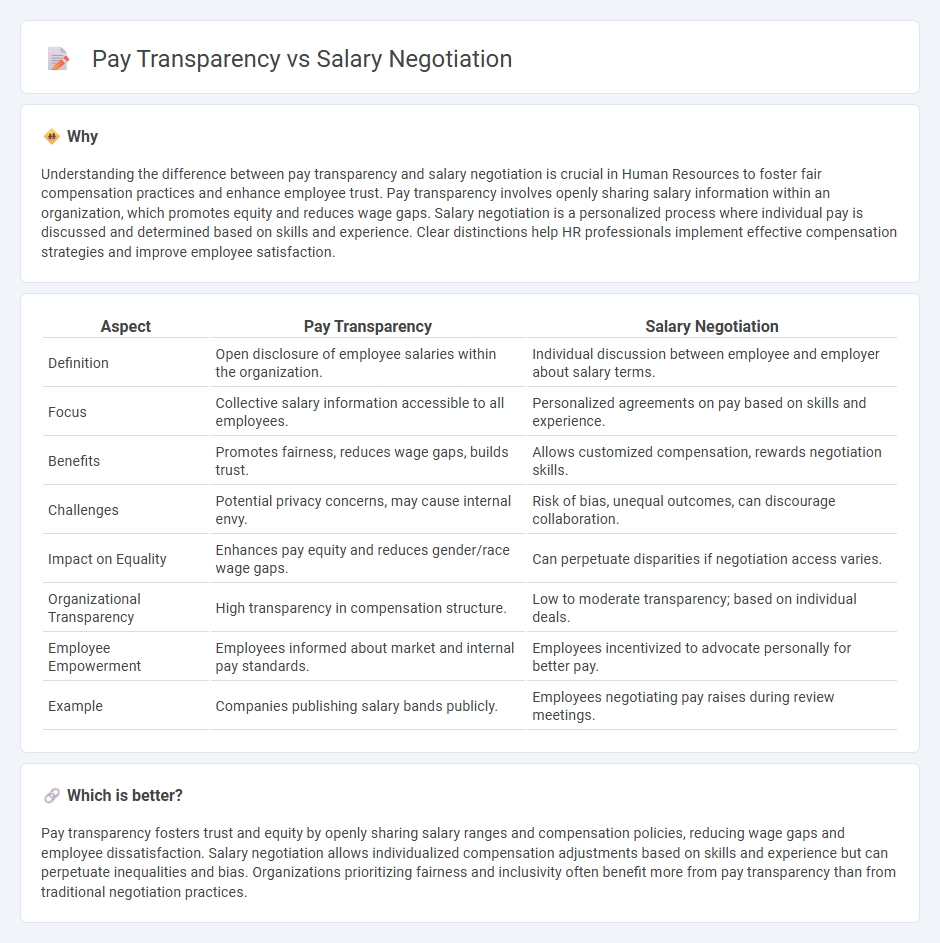
Pay transparency enhances trust and equity by openly sharing salary ranges and compensation policies within an organization. Salary negotiation allows for personalized compensation discussions, enabling employees to advocate for their worth based on skills and market rates. Explore how balancing pay transparency with effective negotiation strategies can optimize talent retention and employee satisfaction.
Why it is important
Understanding the difference between pay transparency and salary negotiation is crucial in Human Resources to foster fair compensation practices and enhance employee trust. Pay transparency involves openly sharing salary information within an organization, which promotes equity and reduces wage gaps. Salary negotiation is a personalized process where individual pay is discussed and determined based on skills and experience. Clear distinctions help HR professionals implement effective compensation strategies and improve employee satisfaction.
Comparison Table
| Aspect | Pay Transparency | Salary Negotiation |
|---|---|---|
| Definition | Open disclosure of employee salaries within the organization. | Individual discussion between employee and employer about salary terms. |
| Focus | Collective salary information accessible to all employees. | Personalized agreements on pay based on skills and experience. |
| Benefits | Promotes fairness, reduces wage gaps, builds trust. | Allows customized compensation, rewards negotiation skills. |
| Challenges | Potential privacy concerns, may cause internal envy. | Risk of bias, unequal outcomes, can discourage collaboration. |
| Impact on Equality | Enhances pay equity and reduces gender/race wage gaps. | Can perpetuate disparities if negotiation access varies. |
| Organizational Transparency | High transparency in compensation structure. | Low to moderate transparency; based on individual deals. |
| Employee Empowerment | Employees informed about market and internal pay standards. | Employees incentivized to advocate personally for better pay. |
| Example | Companies publishing salary bands publicly. | Employees negotiating pay raises during review meetings. |
Which is better?
Pay transparency fosters trust and equity by openly sharing salary ranges and compensation policies, reducing wage gaps and employee dissatisfaction. Salary negotiation allows individualized compensation adjustments based on skills and experience but can perpetuate inequalities and bias. Organizations prioritizing fairness and inclusivity often benefit more from pay transparency than from traditional negotiation practices.
Connection
Pay transparency fosters an environment where employees have clear visibility into salary ranges, enabling more informed and equitable salary negotiations. Transparent compensation data reduces information asymmetry, empowering candidates and employees to negotiate confidently based on market standards and internal equity. This connection enhances trust, supports fair pay practices, and drives improved employee satisfaction and retention.
Key Terms
**Salary Negotiation:**
Salary negotiation empowers employees to advocate for higher compensation based on market value, skills, and experience, often leading to personalized salary packages. This process can highlight disparities and create opportunities for career growth but may also perpetuate wage gaps if not conducted fairly. Explore effective salary negotiation strategies to maximize your earning potential and ensure equitable pay.
Counteroffer
Salary negotiation often hinges on individual bargaining power and can lead to counteroffers as employers seek to retain talent by matching or exceeding competitor offers. Pay transparency reduces reliance on counteroffers by openly sharing salary ranges, promoting fairness, and minimizing wage disparities. Explore how counteroffers impact employee retention and compensation strategies for deeper insights.
Market Benchmarking
Market benchmarking plays a critical role in both salary negotiation and pay transparency by providing objective data on industry salary standards, helping employers align compensation with competitor offerings. In salary negotiation, market benchmarks empower candidates to advocate for fair pay based on current market rates, while pay transparency uses these benchmarks to foster trust and equity within organizations. Discover how leveraging market benchmarking can optimize your compensation strategy and promote workplace fairness.
Source and External Links
Salary Negotiation | Career Development Center - Offers a detailed seven-step process for salary negotiation, emphasizing researching market value, determining your salary range, and considering benefits beyond just salary like vacation and advancement opportunities.
How to Negotiate Salary: 3 Winning Strategies - Advises using competitive or collaborative negotiation strategies to increase starting pay, focusing on demonstrating your value to the employer rather than just the cost of hiring you.
How To Negotiate Salary After a Job Offer (With 13 Tips) - Provides 13 practical tips for negotiating salary after an offer, including preparing your case, researching market standards, and considering job location, experience, and additional benefits.
 dowidth.com
dowidth.com